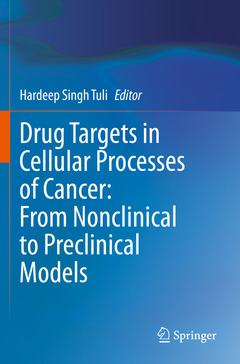Description
Drug Targets in Cellular Processes of Cancer: From Nonclinical to Preclinical Models, 1st ed. 2020
Coordinator: Tuli Hardeep Singh
Language: English
Subjects for Drug Targets in Cellular Processes of Cancer: From...:
Publication date: 10-2021
228 p. · 15.5x23.5 cm · Paperback
Publication date: 10-2020
228 p. · 15.5x23.5 cm · Hardback
Description
/li>Contents
/li>Biography
/li>Comment
/li>
This book explores potential cellular drug targets for cancer therapy. The first couple of chapters describe conventional treatment (radiotherapy, chemotherapy, and immunotherapy) & detection (biosensors) strategies for cancer. In contrast, the subsequent chapters address the role of cyclin-dependent kinases and cell cycle regulatory proteins in the growth of cancer cells and their potential as target for cancer treatment. The book then discusses the regulation of various pro-apoptotic and anti-apoptotic proteins via chemotherapeutic drugs. In addition, it examines the molecular mechanisms that are critical for mediating autophagic cell death in cancer cells. It subsequently reviews the role of reactive oxygen (ROS) species during carcinogenesis and during chemotherapy, and the potential of anti-inflammatory routes for the development of new therapeutic modulators. Lastly, it describes therapeutic strategies that target the tumor microenvironment and various angiogenic pathways for the treatment of cancer and to develop personalized medicine. Given its scope, the book is valuable resource for oncologists, cancer researchers, clinicians, and pharmaceutical industry personnel.
Dr. Hardeep Singh Tuli is an Assistant Professor at the Department of Biotechnology, Maharishi Markandeshwar (Deemed to be University), Mullana Ambala. He previously served as a Lecturer at the Department of Applied Sciences, Institute of Science and Technology, Klawad, Yamunanagar (2009-2011), India. His research interests are focused on the isolation, characterization and biochemical evaluation of natural metabolites as anticancer agents. He has served as a reviewer for several international journals, and as a guest editor for the journal Frontiers in Pharmacology. He has more than 9 years of teaching and research experience in pharmacology, mammalian physiology, and natural products. He has published more than 70 papers in peer-reviewed international journals and authored a number of book chapters. In addition, Dr. Tuli is editorial board member of various national and international scientific research journals.
Explores various cellular targets for cancer therapy
Reviews the role of inflammatory molecules and reactive oxygen species as potential targets for drug development
Examines the potential of apoptotic and autophagy pathways as targets for anticancer therapy
Analyzes the tumor microenvironment and angiogenesis pathway as potential targets
These books may interest you

Multi-Drug Resistance in Cancer 158.24 €



